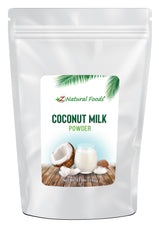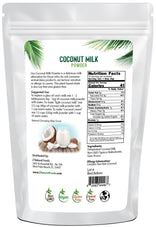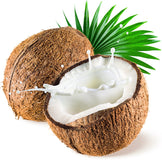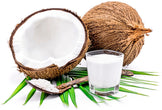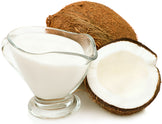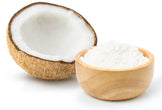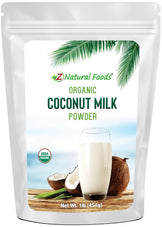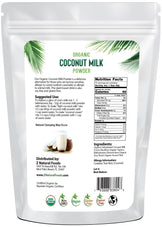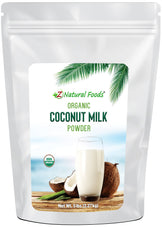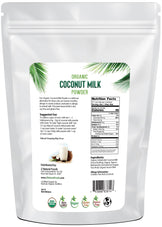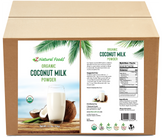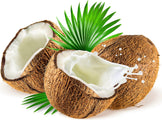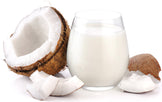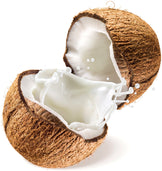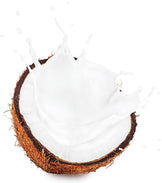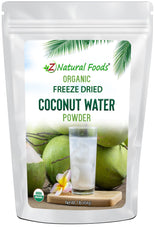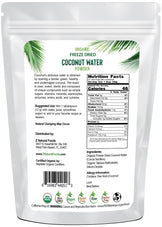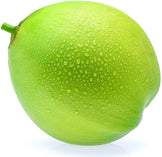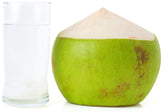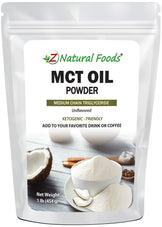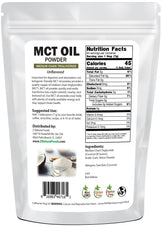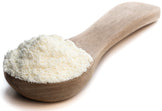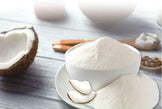Description
Description
1. What is coconut milk powder?
Coconut milk powder is a dehydrated milk product made from the extract of mature coconuts. It is a white powdery substance that is often used as a dairy-free alternative to milk and cream in many recipes.
Unlike other milk powders, coconut milk powder does not need to be reconstituted with water to be used in recipes. Instead, it can be added directly to anything from beverages, curries, and soups, to baked goods and desserts. Coconut milk powder has a creamy texture and a mild, slightly sweet flavor. It is a great source of healthy saturated fats, including lauric acid, which is believed to be beneficial for heart health. Coconut milk powder is also high in dietary fiber, vitamins, and minerals.
It is also a good source of protein, although it is not considered a complete protein since it does not contain all nine essential amino acids. Coconut milk powder is a convenient and versatile pantry staple that can be used in a variety of recipes.
It is generally easier to find and more affordable than coconut milk and cream and is a great choice for anyone looking to reduce their dairy intake.
Go here for more information about our most popular Organic Coconut Milk Powder.
2. How is coconut milk powder different from coconut milk?
Coconut milk powder is a dry product made from coconut milk that has been dehydrated. It is typically made with a blend of coconut milk, maltodextrin, and tapioca maltodextrin. Coconut milk powder is shelf-stable and has a long shelf-life, making it a convenient option for cooking and baking.
Coconut milk, on the other hand, is a liquid product made from the flesh of coconuts. It is usually available in cans or cartons and is often used as a dairy-free alternative in baking and cooking. Coconut milk is also used in drinks and desserts and as a base for soups.
Coconut milk powder is a more concentrated form of coconut milk and a more versatile option for cooking and baking. It is also much more shelf-stable than liquid coconut milk, making it a more convenient choice for those who don’t like to waste food. When cooking or baking, coconut milk powder can be reconstituted with water to create a liquid coconut milk substitute.
However, it should be noted that reconstituted coconut milk will not have the same flavor and texture as fresh coconut milk. In conclusion, coconut milk powder and coconut milk are different products.
Coconut milk powder is a dry, shelf-stable product made from coconut milk, while coconut milk is a liquid product made from coconut flesh. Coconut milk powder is a more convenient and versatile option for cooking and baking.
Go here for a great article explaining the differences between Coconut Milk and Coconut Milk Powder:
Is Coconut Milk Powder the same as Coconut Milk? (Explained)
3. How do I use coconut milk powder?
Coconut milk powder is a versatile ingredient that can be used in a variety of ways.
To use coconut milk powder, you can reconstitute it by combining it with an equal amount of hot water and whisking until fully combined. This can be used as a dairy-free milk alternative in recipes, such as smoothies, curries, or soups. For a creamier consistency, you can use a ratio of one part powder to two parts water.
Coconut milk powder can also be used as a thickening agent in sauces and dressings. Simply add a spoonful of the powder to your liquid ingredients and whisk until it is fully incorporated. It can also be used as a vegan substitute for cream in desserts, such as ice cream or puddings.
Finally, coconut milk powder can be used to make a delicious coconut milk creamer for coffee and tea. Simply mix a spoonful of the powder with hot water and a sweetener of your choice. This creamer can be used hot or cold and makes a tasty addition to your morning cup of joe.
Overall, coconut milk powder is a great addition to your pantry as it can be used in a variety of dishes as a dairy-free alternative or as a thickening agent. With a few simple measurements and a whisk, you can turn this powder into a delicious creamer or milk alternative that will add a delicious coconut flavor to all your favorite recipes.
Go here for two delicious recipes using Coconut Milk Powder:
Is Coconut Milk Powder the same as Coconut Milk? (Explained)
4. What are the health benefits of coconut milk powder?
Coconut milk powder is a dairy-free and low-allergy alternative to cow’s milk, and it offers a range of potential health benefits.
It is high in medium-chain fatty acids, which may improve cholesterol levels and help you feel fuller after eating. Coconut milk powder is low in sugar, carbohydrates, and calories, making it a good choice for people looking to manage their weight.
Coconut milk powder is also a great source of dietary fiber, which can help support digestive health. It contains several vitamins and minerals, including magnesium, phosphorus, and iron. These nutrients can help support bone health, energy levels, and immune system function.
In addition, coconut milk powder is rich in antioxidants, which can help protect cells from damage caused by free radicals. It also contains lauric acid, a fatty acid that may help prevent infection and reduce inflammation.
Overall, coconut milk powder offers a range of potential health benefits, from supporting weight loss to improving digestive health and boosting immunity. It is a nutritious and delicious addition to any diet.
5. Is coconut milk powder vegan?
Coconut milk powder is typically vegan but it is important to double-check the ingredients before purchasing. Most brands use only dehydrated coconut milk, which is vegan, but some may add dairy-based ingredients or other animal products like gelatin.
Be sure to read the ingredients list carefully before buying to make sure all of the ingredients are vegan-friendly. Additionally, it is recommended to check with the manufacturer to ensure that the product was not processed on the same equipment that processes dairy or other animal products.
Coconut milk powder is a great vegan alternative to traditional dairy milk, as it is a natural source of healthy fats and provides a creamy, rich texture. It can be used in a variety of recipes, from smoothies to desserts and curries. Coconut milk powder is also relatively shelf-stable, so it's great for those with limited access to fresh ingredients.
Overall, coconut milk powder is typically vegan, but it is important to double-check the ingredients list and contact the manufacturer to ensure that the product is vegan-friendly before purchasing.
6. Does coconut milk powder have a long shelf life?
Coconut milk powder does have a long shelf life, but it depends on how it is stored. Properly stored, coconut milk powder can last for up to two years. The key is to ensure that the powder is kept in an airtight container and stored in a cool, dry place.
This will help to prevent the powder from absorbing moisture and odors from the environment. Additionally, it is important to keep the powder away from direct sunlight and heat sources.
When it comes to using coconut milk powder, it should be used within a few months of opening to ensure optimum quality and flavor. After opening, it is best to store the powder in an airtight container in the refrigerator to increase its shelf life.
Overall, coconut milk powder can have a long shelf life when stored properly. It is important to keep the powder in an airtight container and stored in a cool, dry place to prevent it from spoiling or losing its flavor and quality. Additionally, it should be used within a few months of opening to ensure optimum quality and flavor.
7. Can I use coconut milk powder as a substitute for regular milk?
Yes, coconut milk powder can be used as a substitute for regular milk. Coconut milk powder is made from the same base ingredient as regular milk - coconut milk. However, it is dehydrated and condensed to form a powder. This powder can then be reconstituted with water to create a liquid form of coconut milk. Coconut milk powder contains the same essential vitamins and minerals as regular milk, including calcium and magnesium.
When substituting coconut milk powder for regular milk, it should usually be mixed with an equal amount of water. It can then be used in the same way as regular milk in recipes, such as for baking, sauces, and smoothies. For example, you can use coconut milk powder as a creamer for coffee or tea, or to make a creamy sauce for pasta.
Although coconut milk powder can be a suitable substitute for regular milk, it may not be as creamy or as thick as regular milk. Additionally, it may have an underlying coconut flavor. Therefore, it is important to consider whether coconut milk powder is the best substitute for a specific recipe.
Go here for a great article comparing common versions of coconut:
Coconut Water vs. Coconut Milk vs. Coconut Cream (The Difference)
8. How much coconut milk powder should I use in a recipe?
The amount of coconut milk powder you should use in a recipe depends on the recipe you are making and the desired texture and flavor you are aiming for. Generally, the amount of coconut milk powder used in a recipe should be equivalent to the amount of liquid coconut milk called for in the recipe. For example, if a recipe calls for one cup of liquid coconut milk, you should use one cup of coconut milk powder.
For a creamier texture, you can increase the amount of coconut milk powder slightly. For example, if the recipe calls for one cup of liquid coconut milk, you could use 1 1/4 cups of coconut milk powder. You can also mix different types of coconut milk to get the flavor and texture you want. For instance, you could mix 1/4 cup of coconut milk powder with 3/4 cup of light coconut milk.
In general, it is best to start with the amount of coconut milk powder called for in the recipe, and then adjust it as needed to get the desired texture and flavor.
9. Can I freeze coconut milk powder?
Yes, it is possible to freeze coconut milk powder. Coconut milk powder is dehydrated coconut milk, and when rehydrated, it can be used as a substitute for fresh coconut milk in recipes.
To freeze, mix the powder with an equal part of cold water and stir until it reaches a smooth consistency. Place the mixture in an airtight container and freeze until needed. Coconut milk powder can last in the freezer for up to six months.
When you’re ready to use it, thaw the mixture in the refrigerator or at room temperature. You may need to add more water or coconut milk powder to get the desired consistency before using it in recipes. Coconut milk powder can be used in a variety of dishes, from soups and curries to smoothies and desserts.
10. What are the best brands of coconut milk powder?
Well, this is an easy question to answer – Z Natural Foods is the best brand of coconut milk powder!
That’s because we offer several kinds of coconut milk powder, ranging from organic, vegan, dairy-free, non-GMO, and gluten-free. For product descriptions and pricing information go here to review our coconut milk powders.
References:
- D'Souza, R., & Shinde, A. (2018). Coconut milk powder: Nutritional benefits, production, and uses. Trends in Food Science & Technology, 83, 201-209. https://doi.org/10.1016/j.tifs.2018.10.011
- Bhat, S., & Bhat, S. (2017). Coconut milk powder: Production, properties, and uses. Comprehensive Reviews in Food Science and Food Safety, 16(4), 806-819. https://doi.org/10.1111/1541-4337.12296
- Bhat, G., & Bhat, S. (2016). Coconut milk powder: A review. International Food Research Journal, 23(3), 951-956. https://www.researchgate.net/publication/303737213_Coconut_milk_powder_A_review
- Stellingwerff, T., & Maughan, R. J. (2018). Coconut milk and coconut oil: Impact on health and performance. Nutrients, 10(8), 1060. https://doi.org/10.3390/nu10081060
- D’Souza, R., & Shinde, A. (2019). Coconut milk powder: Dietary applications and health benefits. Trends in Food Science & Technology, 97, 1-8. https://doi.org/10.1016/j.tifs.2019.09.007
- Yoke, W. (2015). Coconut milk powder: Benefits and uses. Retrieved from https://www.healthline.com/nutrition/coconut-milk-powder
- Bowerman, S. (2019). Everything you need to know about coconut milk powder. Retrieved from https://www.thespruceeats.com/coconut-milk-powder-4777069
- Kaur, S. (2019). Shelf life of coconut milk powder. Retrieved from https://www.healthbenefitstimes.com/shelf-life-of-coconut-milk-powder/
- Abbaspour, N., & Yazdi, F. T. (2014). Coconut milk powder: A dairy-free alternative. Food Science & Nutrition, 2(3), 198-204. https://doi.org/10.1002/fsn3.97



